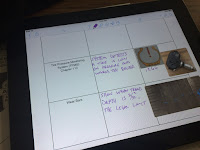Mastery Manager....and whoa!
As we learned from Mr. +Dan Jones and Mr. +Chinh Pham, +Mastery Manager is a program at our disposal that affords us many benefits in regard to assessments. At its introduction to us, many of us understood Mastery Manager as an online program to more efficiently administer tests; however, as the program, and our knowledge of it, grows, we should begin to see it as an accessible tool for creating standards-based, student-centered classrooms that many of us dream about.
One of our most distinguished users of Mastery Manager is Mr. +Paul Fraser. In order to create an instructional unit, Mr. Paul Fraser starts at the very end as outlined in backward design. When thinking about how to assess his Physics students, he first starts by establishing what both the performance objectives (ACT, NGSS, etc.) are as well as content objectives (PLC-based). These objectives drive the activities and instruction within the classroom and are made visible to the students to help them understand. With these objectives in place, Mr. Fraser can begin the arduous task of writing a high quality, objective-based assessment.
To create this assessment, Mr. Fraser begins by making an assessment map, as seen below. In doing this, the objectives are leading the design of the questions. This guides Mr. Fraser and his PLC teammates in creating an assessment that will allow students to accurately demonstrate their learning of the objectives. It also helps the team hold themselves to their own standards when writing the test and to make sure that they’re covering all of the topics that they deem important.
(Photo 1) An assessment map outlining the objectives and topics to be addressed
(Photo 2) The layout of questions to address the learning objectives
Sounds like a pretty effective method of writing an assessment, right?
But wait! There’s more!
After establishing the objectives and writing the assessment, Mr. Fraser leverages the capabilities of Mastery Manager to provide even greater learning opportunities for his students. Once the assessment has been created and uploaded into Mastery Manager, Mr. Fraser tags the questions with the objectives. When he generates the data from an assessment, he is able to see exactly which objectives are being met and by whom. But more importantly, the students are able to see which objectives they met.
With this knowledge, students are able to determine their strengths and weaknesses as they relate to the course objectives. Mr. Fraser said that when students come in for help, they no longer say things like “I don’t understand anything” or “I don’t get it”, but things like “I don’t understand how to describe the interactions between two charged objects.” This is also particularly powerful in a class like AP Physics C when the students are constantly recycling the material and can see their growth throughout the year. In order to support this cognition of their growth, Mr. Fraser provides the students with a log and class time to “dig into the data” therefore better understanding what they are able to do, what they still need to work on, and how to get there. The students use this data to be in charge of their learning of physics and make a more efficient use of their study time.
Whoa.
Mr. Fraser readily admits that the whole process of identifying objectives, uploading them into Mastery Manager, creating an assessment map, writing the assessment, giving the students time to reflect on their learning, etc. takes substantial time and effort. Using Mastery Manager in this way isn’t just a change of test format - it’s a way to change how we teach and ultimately how students learn. It’s part of a larger conversation about how we assess students and what our grades mean.
Interested in starting the conversation or learning more about Mastery Manager? Talk to one of us! Do you like individual attention to learn something new? Schedule an appointment with one of us! Do you already use Mastery Manager in your class? Let us know and we can blog about you!


I've always known how amazing Mr. Fraser is, but I never knew that he was like the ShamWow of math science
ReplyDelete